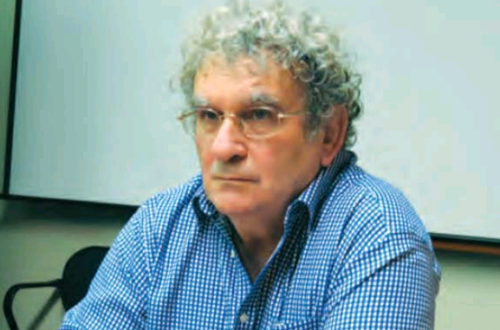by Joseph Weissman via the Huffington Post
There is a certain unspoken complacency amongst many Westerners that all the gains we have made in science and liberty in the past few centuries have come about by liberating the Western man from Christianity, and the style of conservatism that it birthed. Unshackled from clerical binds, the logic goes that society will naturally become more and more wealthy, free and happy.
Yet the “French paradox” has perplexed economists and intellectuals for some time, prompting recent books on the subject. Why should such an overtly secular and wealthy country have so much sadness? Michel Houellebecq explores this unspoken French emptiness in his new novel, and the possibility of it being filled by religion. Philosophers such as Jung and Nietzsche debated whether the West could handle “the death of God.” Soumission‘s answer appears to be “No.”
When Michel Houellebecq was gently mocked in January on the cover of Charlie Hebdo for his grim predictions about the future of France in his novel Soumission(“Submission”), the cover gained more attention than expected. That is because Islamist extremists made the headlines in France for massacring Charlie Hebdo staff shortly thereafter, sparking a debate about freedom of speech and religious sensitivities.
In an age where middle-class liberals can freely laugh about how funny and daring the Book of Mormon is, it is easy to forget the awkwardness and risks involved with portraying Islam critically in the arts.
Ayatollah Khomeini’s fatwa against Salman Rushdie following his Satanic Verses novel lingers long in the memory; a dull yet heavy presence in Western intellectual thought. This was the stand-out occasion when a state put out an international bounty over an artist’s head. Indeed, Michel Houellebecq acknowledges Khomeini’s presence in the epigraph preceding the final section of the novel, noting the ayatollah’s gambit that “Islam is nothing if it is not political”.
If there are no sympathetic portrayal of Islam in the book, it is worth noting there is no sympathetic portrayal of anyone in Houellebecq’s vision. But equally, it is unlikely that the more moderate interpretations of Islam will have anywhere near the societal impact as the political Islamist interpretations, and it is precisely here that Soumission finds its ambience.
A politicized version of Islam and sharia law provides the backdrop for Houellebecq’s enquiry into the life of Francois, a sex-obsessed intellectual who has trouble connecting with people. Soumission is set in Paris of 2022. After elections, the Socialist Party and the Muslim Brotherhood form a coalition, and quickly introduce aspects of sharia law. Meanwhile, Saudi Arabia purchases La Sorbonne, Francois loses his job, and is invited to reapply for it once he converts to Islam.
Whilst the setting is unfamiliar, Submission’s protagonist Francois is classically Houellebecquian, and therefore ripe for the author’s satirical style. Houellebecq has no qualms about mocking himself, as in La Carte et la Territoire – a novel whose story pivots around the murder of a writer named Michel Houellebecq. Certainly, it would be possible to read Soumission as another auto-critique. But it strikes me that the author is attempting something more ambitious: a commentary on France itself.
Houellebecq exaggerates the worst vices of the postmodern man, and sets him on a collision course with the Islamists. Francois is isolated and lacking any meaningful relationships. He boasts of using his female students for brief affairs that he knows will wither away, and is initially attracted to the Islamist idea of having multiple wives for very primitive reasons. Whilst he navigates his connections to other human souls without emotional depth, Francois elaborates happily and graphically regarding the sexual details of his encounters with women. But beyond their looks and their reactions to his harsh words, Francois does not pay much attention to the ladies he spends time with.
That he has a low opinion of women is clear; he does not think it is a good idea for them to even vote. Neither does Francois seem to have any close male friends. Francois lectures at La Sorbonne and specializes in the works of 19th century Parisian writer J. K. Huysmans, who touched upon themes such as religious conversion, iconography, and the monastic life, tinged with a philosophical pessimism. Amongst the living, he operates at a very shallow emotional level. This contrasts with his profound interest in every aspect of Huysmans, who only now exists in Francois’ books. Francois has a deep affinity with Huysmans, bringing his inability to connect with his contemporaries into sharper focus.
Born into a Catholic family, Huysmans turned away from religion during his life, only to turn back towards faith in his latter days. We get the sense that Francois is mimicking Huysman’s spiritual sojourn, albeit in modern times when Islam – rather than Catholicism – is in the ascendancy. Not to put too fine a point on it, Francois visits the cathedral where Huysmans rediscovered religion before his own conversion.
As with Francois and Huysmans, the reader is compelled to wonder whether France too is due a reversion to religion, whether the long period of secularism in France is little more than an extended historical anomaly, and whether political Islam is its dystopian destiny. We are drawn to this question, as the protagonist appears to represents more than simply the Houellebecquian anti-hero; rather, he is Houellebecq’s condemnation of modern France itself.
This character is intellectually rich and sexually liberal, yet lonely and sad. France/Francois is post-religious but at the same time marked out by its lack of religion, compelled and pushed along by a messianic impulse, to eventually turn back towards religious ideology. His emotional disconnect and overwhelming cynicism means that he cannot give compelling reasons for his choices; he simply drifts along with the flow of the river.
As might be expected in a book about political totalitarianism, the Jews play a crucial role. Francois notes how the Socialists and the Brotherhood agree to take a harsher line on Israel. This isn’t in response to an Israeli-Iranian war of Houellebecq’s futuristic imagination – the Middle East sounds quite settled in Soumission. Rather, it is portrayed as matter of doctrine.
This Left-Islamist pact about Israel hints at the central role Jews occupy within any modern day messianic ideology. Anti-Israelism is a perfect topic for the Socialists and the Brotherhood, because both focus on the special iniquity of Jews. This is a theme which has been cultivated in Europe’s religious Christian seedbed, and grown post-religious left-wing offshoots – from Karl Marx’s recommendations on how mankind can emancipate itself from “practical” Judaism, to the Left’s current friendships with Hamas and Hezbollah.
You won’t hear huge swathes of the Left – for whom anti-Zionism is fundamental – criticize Saudi Arabia for beheading and crucifying their own citizens, nor condemn Hezbollah for terrorist activities; nor indeed call out Iran for hanging homosexuals, sponsoring terror, or indeed for issuing fatwas out against novelists. Indeed, the sins of the children of Israel have been a prominent theme in both historical Christianity and Islam alike, with ancient Jewish villains marked out in folklore. Whenever these prejudices have found a political outlet, they have not been kind to the Jews.
Increasingly, many liberals in Europe are dismayed to see the Left tolerating anti-Jewish bigotry which is packaged in Islamist rhetoric, after the Left prided itself for so long on opposing to Nazism, and the compost heap of Christian anti-Semitism that it was cultivated in.
In Soumission itself, Francois’ summertime girlfriend feels the heat from this, and emigrates to Israel for practical rather than ideological reasons, despite her longing to stay. Her sentimental email to Francois is a love letter to her home country. Myriam’s emotional intelligence contrasts with Francois’ coldness, and Francois laments “there is no Israel for me.”
Soumission‘s Socialists agree to other items of relevance for the Brotherhood, permitting bigamy, compulsory teaching of Islam, and for women to wear a veil. IsSoumission a hysterical piece of anti-Islamic fearmongering that is designed to be waved furiously at Front National rallies, as its critics claim? Or is it a biting satire against a society that has lost confidence in its own values, which is too lazy, shallow and dishonest to fight for its own future?
As with any work of art, what Soumission means to its reader will vary according to his own worldview. Art deserves to breathe on its own, and the author ought to be allowed to air his creation. Certainly, the non-Islamic French personalities in Submission are more dislikeable than any of the Muslim ones, and the main character is positively charmed by the Brotherhood’s brand of Islam.
Submission it deserves to be read for the possibilities it conjures up, and for the discussions it will provoke. Time will tell if it is prescient too.


